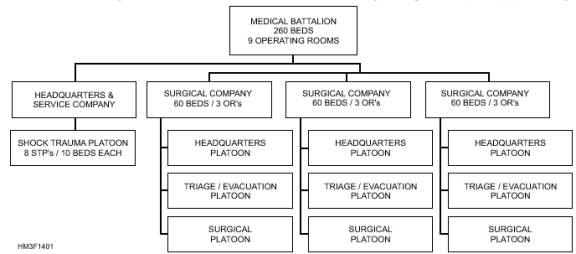FMF DENTAL SUPPORT
The mission of FMF dental units is to furnish
dental services to a Marine Expeditionary Force. By
attaching dental sections and detachments of
the task force, battalion personnel
maintain dental readiness during
exercises, deployments, operations other than
war, and combat operations.
In an emergency environment, the dental
battalions primary mission is to provide dental health
maintenance, with a focus on emergency
care. Personnel from these detachments
may also provide postoperative, ward,
central sterilization, and supply room
support, and other medical support as
determined to be appropriate by the medical battalion
and surgical company commanders.
FLEET HOSPITALS
Initially conceived and developed as facilities to
provide medical support during intense
combat operations, fleet hospitals are
also used in lengthy low-intensity
scenarios. Fleet hospitals are
transportable, medically and surgically intensive
(capable of performing advanced medical and
surgical procedures), and deployable in
a variety of operational scenarios.
Available in sizes ranging from 100 to 500
beds, these health-care assets can be used by a variety
of field commanders. Fleet hospitals are
designed to be used in long-term
operations (60+ days) involving a
 style="mso-spacerun: yes">
style="mso-spacerun: yes">
Figure 14-1.-Organization of a medical battalion.
sizable number of ground forces. Moderately
sophisticated care is provided, along with resuscitative
medical and surgical care, and selected
specialty care. Fleet hospitals are
substantially self-supporting and
relocatable; however, relocatability varies with the
hospital size.
Mission
A fleet hospital's mission depends on its type and
the operation in which it will be used. The
type is determined by bed size and
echelon of care. Fleet hospitals are
designed and staffed to provide Echelon
III or Echelon IV levels of patient care.
Designation
Fleet hospitals designated as active duty facilities
will be manned by active duty personnel,
with a command staff assigned from one
particular naval hospital using the
Medical Augmentation Program (MAP).
Naval Reserve fleet hospitals will be staffed
by preassigned Naval Reserve personnel. After
activation, fleet hospitals are deployed to an
operational theater where command and
control pass to an operational
commander.
Organization
The internal organization of the fleet hospital is
similar to a shore-based MTF. It consists of
the command staff (commanding officer,
executive officer, command master
chief, and special assistants) and five
directorates (nursing service, medical
services, surgical service, ancillary service, and
administrative service).
Security and Safety
Adeployed fleet hospital must have a security plan
that addresses security precautions, threat
response, and disaster recovery. The
security program covers physical,
informational, and classified material
aspects normally included in the area of operation
(AO) security plan. Physical security for
fleet hospitals is both internal and
external.
Fleet hospitals will follow the same OPNAVsafety
program as other operational units. Hospital
commanders establish a safety program and an
internal organization to address safety
issues and appoint a safety officer.
Logistics
Logistics for a fleet hospital include medical
supplies, equipment, and services. Logistical
requirements can range from acquiring raw
material to delivering medical supplies
to a field hospital, or returning
medical equipment to a theater after a patient
evacuation. Tasks of fleet hospital logistics include
contracting, host-nation support, equipment
manage- ment, facilities management, transportation, graves
registration, and postal service. All of the
fleet hospital supply department
operations are conducted in accordance
with NAVSUP P-485.
Personnel
Staffing for active duty fleet hospitals comes from
several CONUS MTFs, while designated reserve
units staff a particular reserve fleet
hospital. Each fleet hospital has its
own active manning document (AMD).
Personnel are normally issued TADorders for
less than 180 days. If the operation exceeds 179 days,
PCS orders may be issued. Replacements are
handled the same way as in any fixed
MTF.
Training
BUMEDis responsible for monitoring the training
of all authorized personnel assigned to fleet hospital
mobilization billets. COMNAVSURFRESFOR is
responsible for overseeing the training of
Naval Reserve personnel assigned to
staff Naval Reserve fleet hospitals.
|







